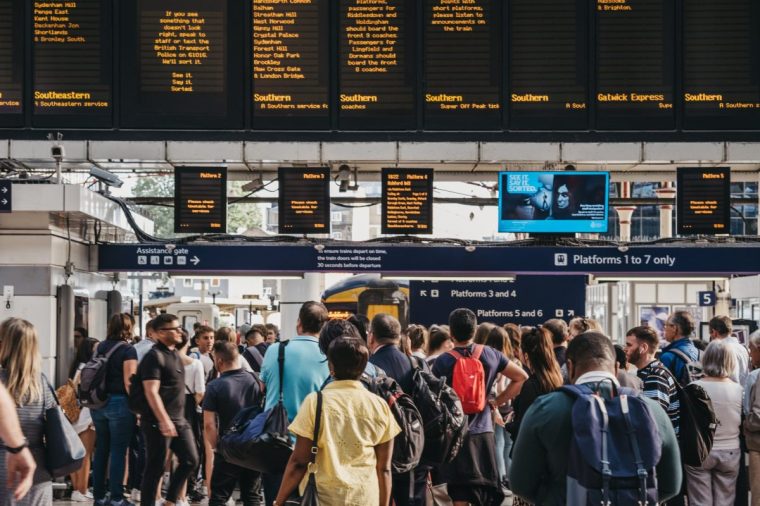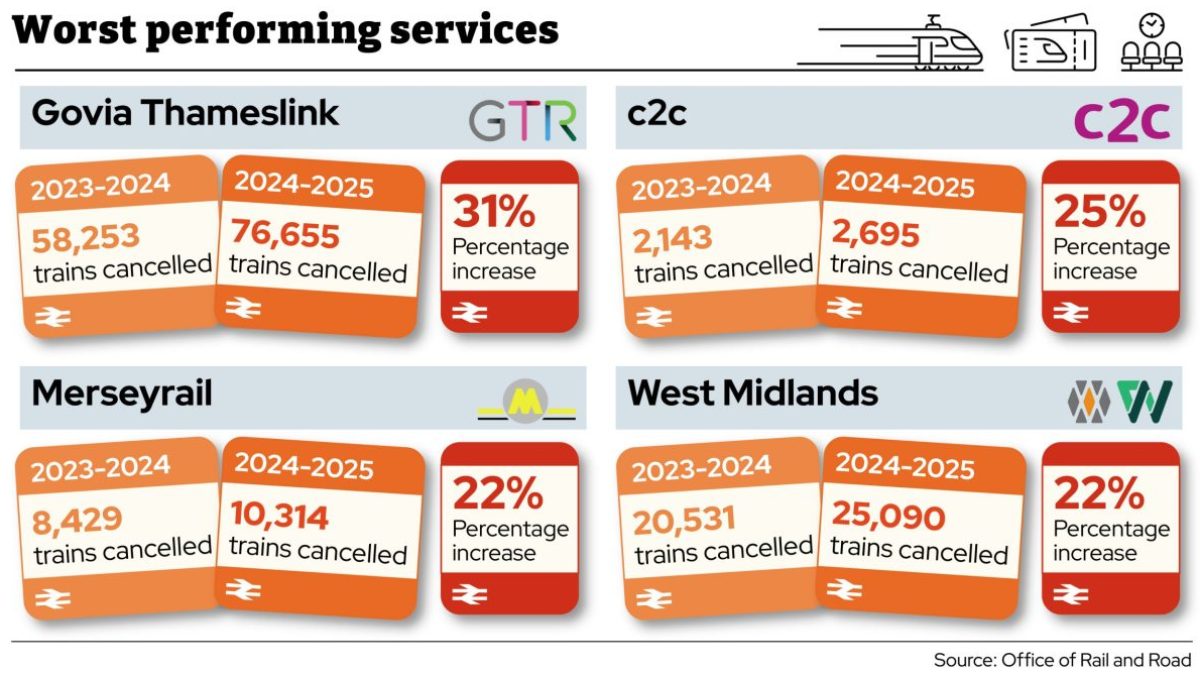More than 1,000 services have been axed per day in the past year, despite the fact fed-up passengers saw ticket prices increase by 4.6 per cent in March
Britain’s rail crisis is getting worse with cancellations up 13 per cent this year, The i Paper can reveal.
More than 384,000 trains were either part-cancelled or fully cancelled across the country in the year ending April 2025, the latest figures from the Office of Rail and Road (ORR) show.
That is the equivalent of more than 1,000 services axed per day despite the fact fed-up passengers saw ticket prices increase by 4.6 per cent in March.
Train companies say the increase is partly because they are running a lot more services as demand on the rail network continues to return following the Covid-19 pandemic.
However, the figures lay bare the scale of the challenge Labour faces to overhaul performance as it continues with a plan to nationalise the industry under the banner of Great British Railways.
The Government has pledged to bring train companies into public ownership when their contracts expire, or sooner if their performance is so bad they are in default of their contract, to avoid having to pay compensation.
Transport Secretary Heidi Alexander admitted to MPs this week that although rail performance is “not where I want it to be”, she does not believe any operator is currently breaching the minimum standards of its contract, blaming the “very generous” terms and conditions agreed to by the previous Conservative government.
“If truth be known it makes it quite hard… for a train operating company to default on a contract so much so that we have cause to be able to take it into public ownership and terminate the contract without paying that compensation,” she told the Transport Select Committee.
But the latest data obtained by The i Paper suggests the Government’s challenge is greater than ever as passengers continue to experience misery across the country.
Govia Thameslink, which runs services in and around London and the South East, cancelled 76,655 trains in the past twelve months, the equivalent of 210 a day.
This is an increase of 31 per cent on last year.
At c2c, which runs services between London and Essex, cancellations are up 25 per cent, at Merseyrail and West Midlands railway they are up 22 per cent and at Southeastern, which runs services in Greater London, they are up 20 per cent.
While Labour maintains nationalisation will lead to better reliability on the network, critics have pointed to the fact that a number of struggling train companies have already been under public ownership for some time.
Northern – one of the country’s largest operators which runs around 2,500 services a day between cities including Manchester, Liverpool and Newcastle – has been under the Department for Transport Operator (DfTO) since 2020 after transport giant Arriva was stripped of the franchise.
However, its performance continues to nosedive with 58,517 trains cancelled in the past 12 months, the equivalent of around 160 trains a day.
 The latest data obtained by The i Paper suggests the Government’s challenge is greater than ever as passengers continue to experience misery across the country (Photo: Alena Kravchenko/Getty Images)
The latest data obtained by The i Paper suggests the Government’s challenge is greater than ever as passengers continue to experience misery across the country (Photo: Alena Kravchenko/Getty Images)
This is up from 140 trains a day in the year ending April 2024 and is more than four times higher than in 2014-15 when the franchise was run privately.
As with most train companies, Northern says staff availability remains a major problem as they rely on volunteers to work on Sundays in many parts of the business.
Labour has pledged to tackle the patchwork of terms and conditions which exist across the rail industry.
However, union members at Northern rejected an interim agreement signed off by the Government for Sunday working last year and the company has been forced to run a reduced timetable ever since.
Silviya Barrett, director of policy and campaigns at Campaign for Better Transport, told The i Paper: “There are many factors behind train cancellations, including weather, infrastructure issues and staff shortages.
“But regardless of who or what is at fault, cancellations and delays make for terrible passenger experiences, and this needs to be tackled.
“While rail operators are already moving under public ownership, it will be years until the new industry body, Great British Railways, is established and able to tackle issues. Passengers need action now.
“Since the pandemic there has been an increase in leisure travel on the railways, while commuting has reduced.
“This means it’s more important than ever that journeys aren’t disrupted at weekends and busy holiday times.”
“So the weekend services have become even more important to passengers.
“From a passenger perspective, whoever is at fault, whatever the challenge, it doesn’t change how they feel about it.”
Critics, including Conservative opponents, have warned Labour that the DfTO has neither the track record of success managing train companies, nor the capacity to take on more workload.
Three more operators – c2c, Greater Anglia and Southwestern – will be absorbed into DfTO in the autumn and then a new franchise will come under public ownership roughly every three months thereafter as contracts expire.
Asked whether DfTO is ready to take more train companies into public ownership, the Transport Secretary told MPs it has increased in size and capacity and that the Government is not “waiting for the establishment of GBR to get on with improving performance on the railways”.
“That’s a key priority for me,” Alexander said. “I think we’re making the right changes in DfT [Department for Transport] and DfTO to ensure that the public will start to see a response, an improvement.”
A DfT spokesperson said: “We know the railways are broken, that’s why the Government is fixing it with generational reform. Great British Railways will deliver more reliable services and return trains to the service of passengers.
“We will end timetable chaos, the overreliance on rest day working, and our passenger watchdog will tackle day-to-day frustrations to give passengers the certainty and reliability they deserve.”
What train companies say
A spokesperson for Govia Thameslink Railway said: “We operate four different train brands with considerably more trains than anyone else, so our number of cancellations is always likely to be greater.
“However, we know our service has sometimes not been good enough and we sincerely apologise. Passengers rightly expect trains to run as advertised and we are working hard, along with our industry partners, to address this.
“Like train operators across the country, we have been affected by more frequent severe weather. At times, seasonal sickness and annual leave have also led to difficulties with driver availability. We are still susceptible to this, which is why we are recruiting 9 per cent more drivers on Thameslink.”
A spokesperson for Northern said: “We have been working hard to stabilise performance in recent months and have made some progress, but realise there is more work to be done before we can deliver long-term improvements for customers across the North of England.
“Addressing the underlying issue of conductor availability is our No 1 priority and we are working to secure a new agreement that will mean we are no longer reliant on them volunteering to work Sundays.
“We are also working to reduce sickness levels by helping staff return to work as well as introducing state-of-the-art simulators to accelerate our training programme and planning to make the largest ever investment in our fleet by introducing up to 450 new trains.”
A Greater Anglia spokesperson said: “Greater Anglia is consistently one of the best performing train operators in the UK, with low rates of train cancellations and significant lateness.
“It has led the ORR’s tables for punctuality for seven successive quarters, with annual punctuality over 94 per cent, using the public performance measure, while annual cancellations are at 1.8 per cent (one of the lowest rates in the UK). In fact, Greater Anglia’s self-caused cancellations were down by over 10 per cent in 2024-25 on 2023-24.
“However, the increased incidence of severe weather incidents, which cause major disruption to services, meant that the combined number of cancelled and significantly late trains did increase in 2024-25 compared to 2023-24.
“We are working with rail industry partners, including Network Rail, to help minimise the impact of severe weather on train services, both by increasing the network’s resilience and enhancing our contingency and service recovery plans to restore normal running as quickly as possible after disruptive incidents.
“We’re sorry for the inconvenience caused to any customers who have suffered disrupted journeys, whatever the cause. We are always, and will always be, fully focused on minimising delays and cancellations and delivering the best possible service for our customers, recognising that a punctual and reliable journey is the most important priority cited by the majority of our passengers.”
A spokesperson for Transport for Wales said: “We are one of the fastest growing train operators in the UK and have increased our services by 12.5 per cent over the last year, with the number of station calls increasing by 45 per cent year-on-year.
“During this time ‘operator caused cancellations’ went up by just 1 per cent. The increase in delays and cancellations has largely been due to the impact of weather events and other external factors on rail network infrastructure.
“We’re transforming the Wales and Borders network with the introduction of £800m of brand new trains on behalf of the Welsh Government and as more of these new trains come into service, we will continue to see improvements in reliability and punctuality.”
A c2c spokesperson: “In the past year, c2c services have returned to near pre-Covid levels, with a notable 9 per cent increase in services. This positive development reflects our commitment to meet the growing demand for reliable train services.
“However, during this period, we have experienced some challenges that have led to train cancellations. The primary causes of these cancellations include faults such as signalling failures, overhead line damage and passenger incidents. Additionally, cancellations due to Driver availability increased significantly in June-July 2024 , which contributed to service disruption.
“c2c has the third lowest rate of cancellations nationally behind Lumo and Caledonian Sleeper making us the best performing train operating company for cancellations in London and the South East, and the best franchised/non-open access operator in the UK.
“We understand the inconvenience these cancellations may cause to our customers and are actively working to address these issues. c2c is dedicated to improving the reliability of its services and ensuring a smoother travel experience for all passengers.”
A London Northwestern Railway and West Midlands Railway spokesperson said: “Offering a reliable service is our priority. We run over 1,200 services each day and, with passenger numbers continuing to climb, are running more trains than the previous year. The increase in services has impacted cancellation numbers, and we are working closely with industry partners to improve performance.
“There are many reasons why an individual service may be cancelled, including adverse weather such as flooding or police incidents on the railway. Any passenger whose journey is delayed by 15 minutes or more for any reason can claim compensation via the Delay Repay scheme.”
A spokesperson for South Western Railway said: “Cancellations were up last year due to challenging weather events such as Storms Bert and Darragh and a series of particularly disruptive trespass and infrastructure problems. We’re sorry for the impact on our customers and continue to work closely with our partners at Network Rail to improve performance.”
